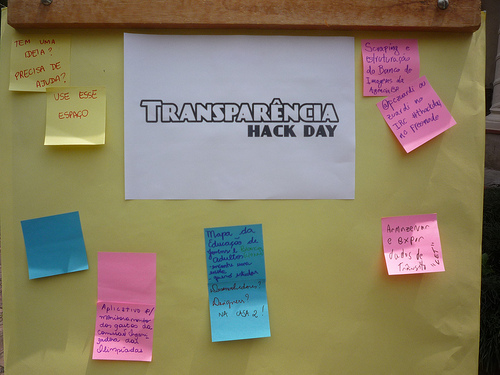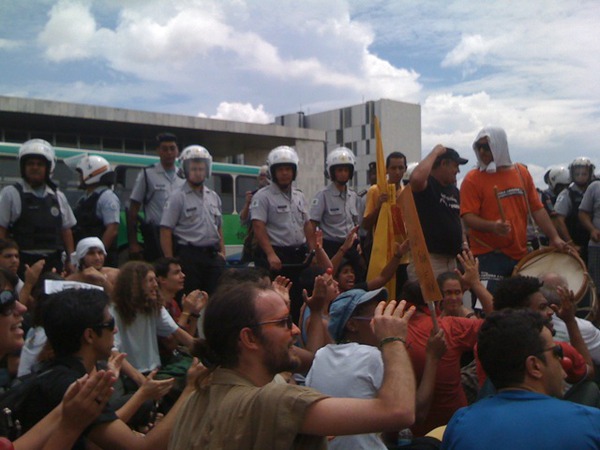On January 18 Global Voices will launch the Technology for Transparency Network [1], a collaborative research mapping of internet projects that promote greater transparency, government accountability, and civic engagement. This is the first in a series of posts that will explore related issues through the eyes of bloggers worldwide. To kick things off we look at how bloggers responded to International Anti-Corruption Day [2], which was signed into law in 2003 at the United Nations Convention against Corruption [3] and takes place every year on December 9th.
On Space for Transparency, the official blog of Transparency International [4], Georg Neumann looks back at the state of anti-corruption activism for 2009:
Increasingly, anti-corruption activists have been in the line of attack [5]. Journalists writing on corruption in politics and society such as Sri Lanka’s Lasantha Wickramatunga earlier this year have given their lives. Activists from Bosnia and Herzegovina, Burundi [6], Guatemala [7] or Zimbabwe have faced threats or were being silenced [5]. Anti-Corruption Day stands for a day to remember, recognise and honour these brave and fearless people, who went to prison or lost their lives believing that through fighting corruption they will make the world a better place.
Neumann also notes that 2009 saw the passing of a flawed review mechanism [8] which doesn't require member states to seek input from independent NGO's based in their countries. In a five-minute YouTube video Peter Eigen, the founder of Transparency International, describes the important role of civil society in fighting corruption and improving governance:
But it wasn't all bad news in 2009, writes Neumann. There are now 40 Advocacy and Legal Advice Centers [9] worldwide providing legal advice to victims of corruption. Also, online social media has proven itself a powerful tool in promoting transparency and fighting against corruption [10]. In India, for example, J. N. Jayashree started a wiki [11] to protect her husband whose safety was threatened [12] as a result of his whistle-blowing activities. In Morocco an anonymous anti-corruption activist has begun posting videos to YouTube of police officers accepting bribes [13].
On Global Voices a number of posts commemorated Anti-Corruption Day last month. Bhumika Ghimire notes [14] that Nepal was ranked [15] by Transparency International as one of the world's most corrupt countries. Linking to other Nepalese bloggers, Bhumika's article shows how corruption in Nepal affects the economy [16], governance [17], public works [18], and even marriage [19].
In Brazil violence broke out on Anti-Corruption Day between police and protesters [21]:
Protesters have been demanding the impeachment of the Governor of the Federal District, Jose Roberto Arruda, and his deputy, Paulo Octavio, in addition to a thorough investigation into all parties cited in the bribery scandal that led to a police operation codenamed Pandora Box. According to the investigation, Governor Arruda is the possible head of a R$ 600,000 (approximately $340,000) per month bribery scheme that has benefited allies among district members of parliament, businessmen and government officials.
 [22]
[22]Transparency HackDay in São Paulo, photo by Alexandre Fugita used under a Creative Commons license.
But there is also reason for optimism in Brazil when it comes to transparency and open governance, as Paula Goés explained a week before Anti-Corruption Day:
The first Transparência [Transparency] Hackday, “two days for hacking into Brazilian politics”, was launched in São Paulo at the beginning of October, and the last camp took place this week, on December 1st and 2nd, in the capital Brasília [23] [pt]. Organized by journalists Daniela Silva [24] and Pedro Markun [25] [both pt], the event has free entry and is an opportunity for software developers, journalists and researchers to gather together to find ways to “scrape” data from official websites and create applications that bring transparency and participation to the political processes.
Global Voices editors also point readers to a number of posts around the blogosphere related to transparency, corruption, and government accountability. Peter Marton looks at the harmful role of corruption in rebuilding Afghanistan [26]. In Ukraine, meanwhile, Petro congratulates [27] the residents of Kabul for sentencing their mayor to four years of prison for corruption and imagines how quickly Kyiv's prisons would fill up if the same laws were enforced in his country. Writing in Registan.net, Alexander Visotzky looks at the corruption charges against Mukhtar Dzhakishev [28] for the illegal sale of Uranium and concludes [29], “The fight against corruption in Kazakhstan is apparently much more of a political game than an attempt to root out corruption.” Writing from Japan, Scilla Alecci points to [30] Transparency International's Ten Worst Corruption Cases of 2009 in Japan [31]. Finally, writing from the Caribbean island of Puerto Rico, “Gil the Jenius” asks for tougher punishments against public officials convicted of corruption [32].
Looking back on anti-corruption activism in 2009 we see that an entrenched culture of corruption is still pervasive worldwide. But we also see a growing online discussion about what can be done to curb corruption, promote transparency, and increase civic engagement. In future posts we'll look more specifically at online discussions and internet-based projects to promote transparency and fight against corruption in Nigeria and China.
